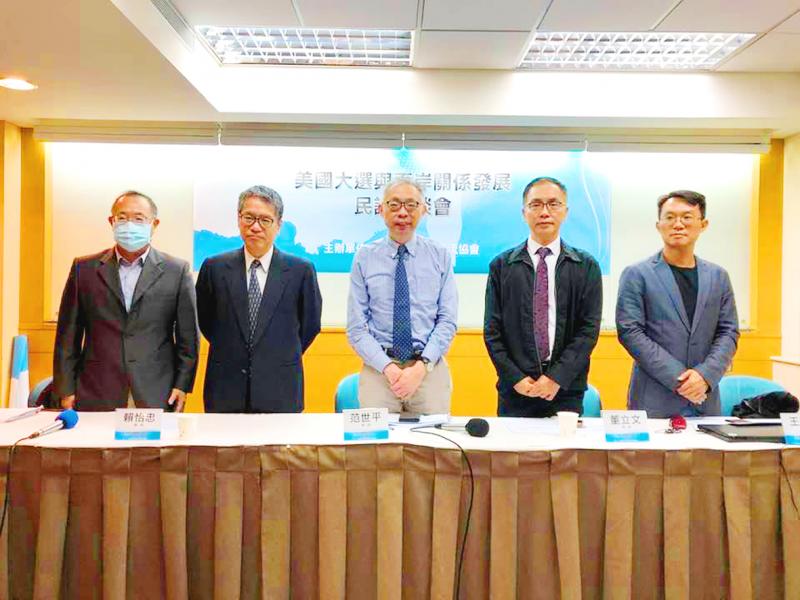Sixty-three percent of respondents had a positive outlook for Taiwan-US relations, regardless of who wins the US presidential election, an Association of Chinese Elite Leadership survey showed yesterday.
Asked how they thought bilateral relations would develop after the election, 52.8 percent of respondents said that the situation would be similar to before the election of US President Donald Trump in 2016, 10.2 percent said they thought the relationship would improve, 24.3 percent said it would worsen and 12.7 percent declined to answer, the association said.
Taiwan National Policy Research Association consultant Tung Li-wen (董立文) told a news conference in Taipei announcing the results that they showed most Taiwanese are optimistic about the future of the Taiwan-US relationship.

Photo: CNA
Asked about their views on post-election US-China relations, 47.1 percent said they thought that the relationship would improve, 33.5 percent said it would become “fair and unbiased, as it was prior to 2016,” 11.2 percent said it would worsen and 8.2 percent said they were unsure or declined to answer, the survey showed.
Asked about their views on Taiwan’s two main political parties, 42.6 percent agreed and 50.8 percent disagreed that the Chinese Nationalist Party (KMT) was “pro-China and anti-US,” while 67.9 percent agreed and 26.9 percent disagreed that the Democratic Progressive Party (DPP) was “pro-US and anti-China.”
Asked which party’s stance aligned best with the opinions of Taiwanese, 51.2 percent said the DPP and 19.3 percent said the KMT, the survey showed.
Asked which party would best protect Taiwan’s national security, 45.2 percent said the DPP and 21.5 percent said the KMT, it showed.
The survey, conducted on Thursday and Friday, collected 1,077 valid samples and had a margin of error of 2.99 percentage points.
Separately, the Facebook account of the American Institute in Taiwan on Friday was inundated with messages such as “Biden is a joke,” and “the US Republican Party are the dogs of the evil Chinese Communist Party.”
The Ministry of Foreign Affairs yesterday said that the messages were an attempt to “drive a wedge between supporters of each party and destroy the US-Taiwan relationship.”
Additional reporting by Peng Wan-hsin

NATIONAL SECURITY THREAT: An official said that Guan Guan’s comments had gone beyond the threshold of free speech, as she advocated for the destruction of the ROC China-born media influencer Guan Guan’s (關關) residency permit has been revoked for repeatedly posting pro-China content that threatens national security, the National Immigration Agency said yesterday. Guan Guan has said many controversial things in her videos posted to Douyin (抖音), including “the red flag will soon be painted all over Taiwan” and “Taiwan is an inseparable part of China,” while expressing hope for expedited “reunification.” The agency received multiple reports alleging that Guan Guan had advocated for armed reunification last year. After investigating, the agency last month issued a notice requiring her to appear and account for her actions. Guan Guan appeared as required,

A strong cold air mass is expected to arrive tonight, bringing a change in weather and a drop in temperature, the Central Weather Administration (CWA) said. The coldest time would be early on Thursday morning, with temperatures in some areas dipping as low as 8°C, it said. Daytime highs yesterday were 22°C to 24°C in northern and eastern Taiwan, and about 25°C to 28°C in the central and southern regions, it said. However, nighttime lows would dip to about 15°C to 16°C in central and northern Taiwan as well as the northeast, and 17°C to 19°C elsewhere, it said. Tropical Storm Nokaen, currently

‘NATO-PLUS’: ‘Our strategic partners in the Indo-Pacific are facing increasing aggression by the Chinese Communist Party,’ US Representative Rob Wittman said The US House of Representatives on Monday released its version of the Consolidated Appropriations Act, which includes US$1.15 billion to support security cooperation with Taiwan. The omnibus act, covering US$1.2 trillion of spending, allocates US$1 billion for the Taiwan Security Cooperation Initiative, as well as US$150 million for the replacement of defense articles and reimbursement of defense services provided to Taiwan. The fund allocations were based on the US National Defense Authorization Act for fiscal 2026 that was passed by the US Congress last month and authorized up to US$1 billion to the US Defense Security Cooperation Agency in support of the

PAPERS, PLEASE: The gang exploited the high value of the passports, selling them at inflated prices to Chinese buyers, who would treat them as ‘invisibility cloaks’ The Yilan District Court has handed four members of a syndicate prison terms ranging from one year and two months to two years and two months for their involvement in a scheme to purchase Taiwanese passports and resell them abroad at a massive markup. A Chinese human smuggling syndicate purchased Taiwanese passports through local criminal networks, exploiting the passports’ visa-free travel privileges to turn a profit of more than 20 times the original price, the court said. Such criminal organizations enable people to impersonate Taiwanese when entering and exiting Taiwan and other countries, undermining social order and the credibility of the nation’s